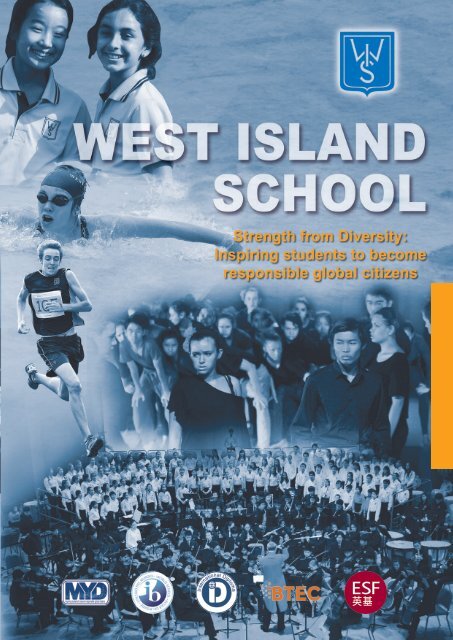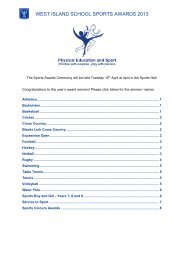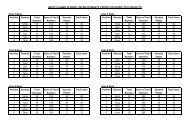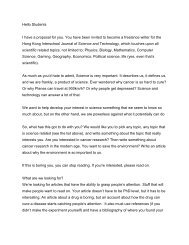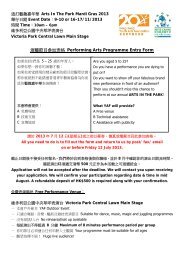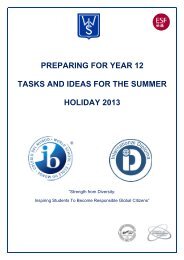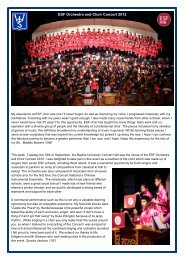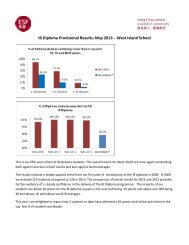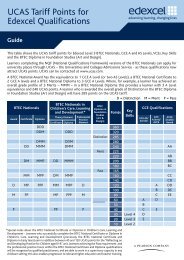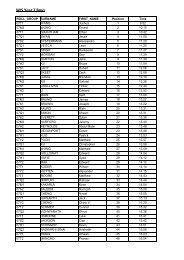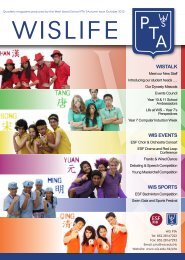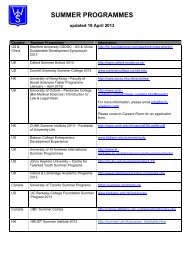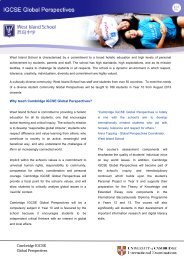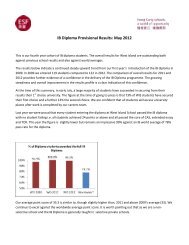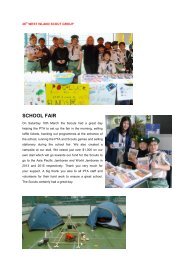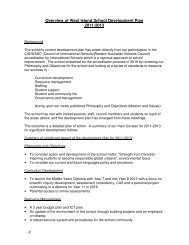WIS Prospectus 2012 - West Island School New Portal
WIS Prospectus 2012 - West Island School New Portal
WIS Prospectus 2012 - West Island School New Portal
Create successful ePaper yourself
Turn your PDF publications into a flip-book with our unique Google optimized e-Paper software.
Strength from Diversity:<br />
Inspiring students to become<br />
responsible global citizens
TABLE OF CONTENTS<br />
OUR MISSION, AIMS AND VALUES ........................................................ page 1<br />
WELCOME FROM THE PRINCIPAL ...................................................................... 2<br />
OUR HISTORY ..................................................................................................... 3<br />
SCHOOL ORGANISATIONS ...............................................................................4-5<br />
A BROAD AND BALANCED CURRICULUM ......................................................6-7<br />
WEST ISLAND SCHOOL LEARNER PROFILE ........................................................ 8<br />
GUIDANCE AND ACHIEVEMENT ........................................................................ 9<br />
CREATIVITY, ACTION, SERVICE (CAS) PROGRAMME ....................................... 10<br />
LEARNING FOR LIFE .......................................................................................... 11<br />
ENGLISH AS AN ADDITIONAL LANGUAGE .................................................12-13<br />
INDIVIDUAL NEEDS ........................................................................................... 14<br />
EXTENSION AND ENRICHMENT........................................................................ 15<br />
LEARNING TECHNOLOGIES .............................................................................. 16<br />
LIBRARY ............................................................................................................ 17<br />
CAREERS AND UNIVERSITY .............................................................................. 18<br />
FACULTY AND CURRICULUM INFORMATION<br />
CREATIVE ARTS .........................................................................................19-21<br />
DESIGN, TECHNOLOGY & ICT.....................................................................22-25<br />
ENGLISH ........................................................................................................ 26<br />
INDIVIDUALS & SOCIETIES .........................................................................27-31<br />
MATHEMATICS .............................................................................................. 32<br />
MODERN FOREIGN LANGUAGES .................................................................... 33<br />
PHYSICAL EDUCATION AND SPORT ...........................................................34-35<br />
SCIENCE ...................................................................................................36-37
<strong>West</strong> <strong>Island</strong> <strong>School</strong><br />
OUR MISSION, AIMS AND VALUES<br />
Strength from Diversity: Inspiring Students To Become Responsible Global Citizens<br />
Our Mission, Aims and Values<br />
We seek to encourage individuality; foster respect for difference and value learning from others<br />
within an international community school.<br />
We strive to inspire and support all students in achieving their individual potential for a successful life<br />
as responsible global citizens.<br />
Our Aims<br />
• To promote excellence and enjoyment in teaching and learning<br />
• To motivate through high expectations of personal initiative and individual achievement<br />
• To challenge in academic, sporting and creative endeavour<br />
• To provide an inclusive, balanced and culturally diverse curriculum which is centred on the<br />
attributes of the <strong>WIS</strong> learner profile<br />
• To encourage the ethical, emotional and physical development of each individual<br />
• To provide a safe, supportive and happy environment<br />
• To commit to holistic education in providing a diverse range of meaningful opportunities beyond<br />
the classroom<br />
• To develop lifelong learners who approach the world with confidence and curiosity<br />
Our Values<br />
Community:<br />
Compassion:<br />
Consideration:<br />
Commitment:<br />
Courage:<br />
Collaboration, team work and unity of purpose<br />
Service and action at school, locally and globally<br />
Honesty, tolerance and respect for others<br />
Recognition of our place and responsibilities within the communities in which we<br />
live<br />
To challenge ourselves as individuals and as a community<br />
1
Strength from Diversity: Inspiring students to become responsible<br />
global citizens<br />
WELCOME FROM THE PRINCIPAL<br />
Creating an International Community <strong>School</strong><br />
I am extremely proud to be the Principal of <strong>West</strong> <strong>Island</strong> <strong>School</strong>. Our school has been established in<br />
the best traditions of the English <strong>School</strong>s Foundation (ESF) to provide excellence in education of<br />
students from eleven to eighteen years of age who want an English medium education. We<br />
are housed in an exciting and innovative building from where we can see the University of<br />
Hong Kong, Hong Kong’s biggest teaching hospital, the Cyber Port and the busy shipping<br />
lanes that demonstrate the key position of Hong Kong on the Pacific Rim’s super highway.<br />
We have an outstanding record of academic attainment and we welcome students of all<br />
races to join us on what we believe is a learning super highway connected to prestigious<br />
destinations all over the world.<br />
<strong>West</strong> <strong>Island</strong> <strong>School</strong>’s distinction lies in the pursuit of high academic attainment through support,<br />
encouragement, praise and motivation. The quality of the relationship between students and teachers<br />
is outstanding as is the quality of teaching and learning. We believe in partnership between students,<br />
parents, teachers and support staff and view our cultural diversity (we have over 40 nationalities<br />
represented) as a means of enriching school life. Our school has a strong sense of deep links to the<br />
local community and engages in global action to aid others as a central mission; hence our motto<br />
“Inspiring students to become responsible global citizens”. Above all else, <strong>West</strong> <strong>Island</strong> <strong>School</strong> is a<br />
happy community-focused school where people are valued and can fulfil their potential both as<br />
teachers and learners. We believe fundamentally that the school has a duty to create students who<br />
embody the <strong>West</strong> <strong>Island</strong> <strong>School</strong> Learner Profile and we strive to develop these attributes in our students<br />
during their time here.<br />
A particular strength of the school is our unique “Middle Years Diploma” spanning Years 7 – 11 which<br />
encapsulates learning as a journey. Concentration on inquiry based, trans disciplinary learning in Years<br />
7 and 8, a specific personal project in Year 9 as well as a focus upon learning beyond the classroom are<br />
at the heart of this diploma. In Years 10 and 11 we continue to offer a breadth of opportunity with I/<br />
GCSEs and BTEC qualifications.<br />
In our upper school we move into two educational pathways: the International Baccalaureate (IB) and<br />
the International Diploma. Both embrace the notion of international mindedness and have at their<br />
heart a commitment to creativity, action and service (CAS) as well as project based work which will lead<br />
to extended essay skills, research or work skills or teaching of the Theory of Knowledge. In addition,<br />
we provide for the Scholastic Aptitude Test (SAT) and other requirements for university admission.<br />
All courses focus on the skill of becoming independent learners vital to the 21st century student<br />
and adult. We pride ourselves on using best educational practice with an increasing emphasis on<br />
embedding technology into the learning experience.<br />
Breadth and balance matter to us. <strong>School</strong>s are more than the sum of their lessons and at <strong>West</strong><br />
<strong>Island</strong> <strong>School</strong> we offer a wide range of extra-curricular activities and opportunities which enable<br />
students to display responsibility and leadership. These include the Upper <strong>School</strong> Council, Student<br />
Leaders, mentoring programmes, the Dynasty (House) system, debating, Model United Nations, local<br />
and international field trips, sporting activities of every type, music and drama, ICT clubs and work<br />
experience. A particular focus is upon developing genuine and meaningful service which impacts our<br />
community and challenges our students.<br />
In short, life at <strong>West</strong> <strong>Island</strong> <strong>School</strong> is full of challenge and opportunity - both academic and personal.<br />
Jane Foxcroft<br />
Principal of <strong>West</strong> <strong>Island</strong> <strong>School</strong><br />
2
<strong>West</strong> <strong>Island</strong> <strong>School</strong><br />
OUR HISTORY<br />
In 1990 the government of Hong Kong responded favourably to the request of the English<br />
<strong>School</strong>s Foundation (ESF) to set-up a new ESF secondary school. It was felt that the pressure<br />
for secondary school places would come first on the island and the government allocated<br />
a site in Pokfulam. In September 1991 <strong>West</strong> <strong>Island</strong> <strong>School</strong> began, with six full-time and six<br />
part-time teachers and eighty four Year 7 students in temporary rented accommodation in<br />
the old British Military Hospital in Borrett Road.<br />
Our current location, home since 1994, was designed by architect Patrick Lau who won<br />
various accolades for this exciting concept of education on an implausible site overlooking<br />
the sea and blending beautifully into its surroundings. Our parents, teachers and students<br />
all followed the growth of the new building with visits, advice and interest – the first<br />
time many of us had such an experience. From the beginning of <strong>West</strong> <strong>Island</strong> <strong>School</strong>,<br />
we wanted recognition of the partnership in education between students, parents and<br />
teachers as a school community. The PTA began three months before the school opened<br />
and the Student Council soon became an integral part of school management. <strong>West</strong> <strong>Island</strong><br />
<strong>School</strong> celebrated its 20th Anniversary in 2011 and today we continue to maintain these<br />
partnerships and our standards of excellence.<br />
<strong>West</strong> <strong>Island</strong> <strong>School</strong> was the first ESF school to offer the Mandarin language to all students<br />
and the first to be divided into Chinese dynasties instead of houses. We want our students<br />
to benefit uniquely from spending time in the school and embracing the many different<br />
cultural experiences to which they are exposed. We hope that this will serve as a life-long<br />
reminder for them.<br />
<strong>West</strong> <strong>Island</strong> <strong>School</strong> is a vibrant, living organisation and as such changes perpetually. We<br />
can always see better ways to go forward<br />
and we remain open to suggestions from<br />
all our partners so that together we can<br />
move towards our ideal international<br />
community school.<br />
3
SCHOOL ORGANISATIONS<br />
<strong>School</strong> Support Staff<br />
The school office is open from 7.30 am to 4.30 pm each<br />
working day. The general office staff offer a warm welcome to<br />
visitors to the school as well as providing an efficient service<br />
to students, staff and parents. Two student receptionists,<br />
selected on a rotational basis, assist by receiving general<br />
enquiries and are supervised by the <strong>School</strong> Reception Leader.<br />
This practice encourages and creates good interaction between<br />
office staff and students. There is a strong support team of<br />
approximately 60 staff employed by <strong>West</strong> <strong>Island</strong> <strong>School</strong> as<br />
well as the PTA and catering personnel, all serving the school.<br />
Student Council<br />
When the school was founded in September 1991, the students played an important role in helping<br />
to determine the school’s aims, values and policies. The school badge was designed by one of the first<br />
<strong>West</strong> <strong>Island</strong> <strong>School</strong> students. The recent development of our Aims and Values was also formed with<br />
the student council’s input and approval.<br />
The Student Council aims to allow students to continue to have full involvement in the life and work<br />
of the school. Each tutor group elects one representative who then serves for a school year. The<br />
council meet with staff regularly to discuss a wide variety of issues and topics relating to the day-today<br />
planning and smooth running of the school in lower, middle, upper and whole school forums.<br />
This important avenue of communication between staff, students and the PTA gives all students a<br />
chance to air their views, express concerns and make suggestions for improvements in any way that<br />
benefits the total population of <strong>West</strong> <strong>Island</strong> <strong>School</strong>.<br />
In addition, upper school Dynasty Captains meet regularly to discuss<br />
student issues and creative ideas are given to the Leadership team of the<br />
school regularly.<br />
<strong>West</strong> <strong>Island</strong> <strong>School</strong> Alumni Association<br />
The <strong>West</strong> <strong>Island</strong> <strong>School</strong> Alumni Association (<strong>WIS</strong>AA) was established in<br />
2007 and comprises students and staff who have graduated or worked at<br />
<strong>West</strong> <strong>Island</strong> <strong>School</strong> since its inception. All alumni are encouraged to join<br />
the <strong>WIS</strong>AA and participate in the events organized by the school. A group<br />
has also been established on Facebook to facilitate on-going connections<br />
and the sharing of news and events.<br />
<strong>School</strong> Council<br />
The <strong>West</strong> <strong>Island</strong> <strong>School</strong> Council is the governing body of <strong>West</strong> <strong>Island</strong> <strong>School</strong><br />
and comprises community members, parents, staff, the Head Students, the<br />
CEO of ESF or her representative and the Principal. Details of the school<br />
councillors can be found on the school’s website.<br />
4
<strong>West</strong> <strong>Island</strong> <strong>School</strong><br />
The key roles of the council are to provide a strategic overview, act as a critical<br />
friend and ensure accountability, while working within the strategic framework<br />
set by the ESF’s Board of Governors. Included in the <strong>School</strong> Council’s remit are:<br />
• Involvement in setting the school’s annual budget and its approval<br />
• Helping to decide the priorities for developing the school when the school<br />
development plan is being drawn up<br />
• Monitoring the school’s performance<br />
• Approving staff appointments<br />
The <strong>School</strong> Council meets a minimum of five times a year. Its two subcommittees<br />
– Finance and Fund-raising and Staffing and Recruitment – meet in addition to this.<br />
Parent Teacher Association<br />
The <strong>West</strong> <strong>Island</strong> <strong>School</strong> Parent Teacher Association (PTA) is run by a committee of parents and<br />
teachers, including the school Principal, and is attended by the Deputy Head Students and middle<br />
school ambassadors, who meet on a monthly basis to discuss various matters pertaining to the<br />
school. The PTA also acts as a bridge between parents and the school and all parents are welcome to<br />
attend these meetings. There are frequently guest speakers at meetings who explain, for example,<br />
new procedures in the school and plans for special events.<br />
The PTA publishes a quarterly newsletter, <strong>WIS</strong>LIFE, during term-time, runs the uniform shop and<br />
the bookshop, and manages the provision of school buses for students. The PTA raises funds to<br />
finance various items of equipment for the school, which are not otherwise funded by ESF, as well as<br />
donating to several service projects. In addition to holding various events throughout the year, the PTA<br />
organises the annual fair, which is the main fundraiser for its activities. All parents are encouraged to<br />
participate in life at the school by joining the PTA each year.<br />
Uniform<br />
Students in Years 7 to 11 are expected to wear school uniform as it reflects our sense of <strong>West</strong> <strong>Island</strong><br />
<strong>School</strong> as a community. <strong>School</strong> uniform is worn both while at school, when traveling to and from<br />
school and at events organised by the school.<br />
In recognition of the upper school students’ senior status and of the fact that they will soon enter<br />
Tertiary Education or the world of work,<br />
they do not have to wear school uniform.<br />
It is expected that students wear clothes<br />
sensitive and appropriate to the cultural<br />
diversity of the school.<br />
Catering<br />
We have 4 outlets provided by our school<br />
caterers which offer a variety of menus<br />
focussing on healthy eating. Parents<br />
and visitors are also welcomed into our<br />
Café “<strong>WIS</strong>ACCINO” (an initiative of the<br />
Student Council) which is a more relaxed<br />
setting mainly for older students.<br />
4<br />
5
A BROAD AND BALANCED CURRICULUM<br />
Pre 16 Learning (Years 7-11)<br />
<strong>West</strong> <strong>Island</strong> <strong>School</strong> provides a broad and balanced curriculum<br />
characterised by a range of meaningful learning experiences<br />
in and beyond the classroom. Guided by the school’s vision<br />
and values, the pre 16 curriculum creates a focus for student<br />
learning based upon attributes of the <strong>West</strong> <strong>Island</strong> <strong>School</strong><br />
Learner Profile, the importance of transferable skills, choice<br />
and personalisation, and a genuine commitment to creativity,<br />
action and service.<br />
&<br />
INDIVIDUALS<br />
SOCIETIES<br />
ENGLISH LANGUAGE<br />
& LITERATURE<br />
LANGUAGES<br />
MYD<br />
Personal Project<br />
Creativity Action Service<br />
Physical Education<br />
Learning 4 Life<br />
ICT<br />
MATHEMATICS<br />
CREATIVE ARTS<br />
WEST ISLAND SCHOOL LEARNER PROFILE AND ATTITUDES TO LEARNING<br />
SCIENCE<br />
TECHNOLOGY<br />
Learning in Year 7<br />
The school has recently introduced its own diploma for students at pre 16 level. Starting with Year<br />
7 students in August 2011, and with each subsequent year group, learning at pre 16 level will<br />
culminate in the award of the <strong>West</strong> <strong>Island</strong> <strong>School</strong> Middle Years Diploma (MYD), at the end of Year 11.<br />
This diploma has been designed by <strong>West</strong> <strong>Island</strong> <strong>School</strong> teachers for <strong>West</strong> <strong>Island</strong> <strong>School</strong> students.<br />
Seven curriculum areas comprise the MYD. Students study a range of subjects which at some point<br />
cover all seven areas. Students also complete all five core components as shown in the centre of<br />
the wheel. Creativity, action and service (CAS), the personal project (PP), Physical Education and<br />
Sport, Information Communication Technology (ICT) and Learning for Life are central to the learning<br />
philosophy of the MYD.<br />
Learning in Years 8 and 9<br />
The school provides access for students in Years 8 - 9 to learning in a broad range of curriculum areas.<br />
All students experience learning in the following curriculum areas: Creative Arts (Art, Drama and<br />
Music), English, Individuals and Societies (Humanities), Languages, Learning for Life, Mathematics, PE<br />
and Sport, Science and Technology.<br />
In addition, as in Year 7, Year 8 - 9 students, at various times of the year, experience lessons in<br />
humanities, science, mathematics and creative arts using an inquiry framework which allows for the<br />
development of thinking skills and tools, multiple intelligences, learning styles and self-assessment. In<br />
Year 8 the school is also developing an interdisciplinary approach to inquiry in a number of curriculum<br />
areas.<br />
6
<strong>West</strong> <strong>Island</strong> <strong>School</strong><br />
Learning in Years 10 and 11<br />
Learning in Years 10 and 11 further builds on the skills, knowledge and understanding developed<br />
in Years 7 - 9 and prepares students for the challenges of either the International Baccalaureate<br />
Programme (IB) or the International Diploma Programme (ID). The pre 16 learning journey culminates<br />
at the end of Year 11 for the majority of students in external final examinations, and/or, internal<br />
assessments. These lead to the award of internationally recognised certificates from a range of<br />
external examination boards and/or awarding bodies such as Cambridge International Examinations<br />
(CIE), Edexcel and the British Technology Education Council (BTEC). At the age of 15 or 16 our<br />
students will complete Year 11 with up to nine GCSE qualifications (including two English and two<br />
Science).<br />
Learning in Years 12 and 13<br />
In Years 12 and 13 (upper school) students continue their education<br />
by choosing the International Baccalaureate (IB) Diploma or the<br />
International Diploma. In the IB programme, students opt for<br />
3 higher level and 3 standard level subjects. These subjects<br />
are chosen from the IB hexagon. Students also complete<br />
the IB core which consists of the extended essay, theory<br />
of knowledge and CAS. The IB is the most widely<br />
recognised international academic programme and<br />
provides our students with opportunities to access<br />
higher education worldwide. The International<br />
Diploma is based around a major and minor BTEC<br />
level 3 qualification. Students also follow work skills,<br />
work placement, extended project and CAS components.<br />
This programme offers students excellent opportunities to<br />
access applied learning pathways at colleges and universities.<br />
7
WEST ISLAND SCHOOL LEARNER PROFILE<br />
The aim of all International Baccalaureate (IB) programmes is to develop internationally minded<br />
people who, recognizing their common humanity and shared guardianship of the planet, help to<br />
create a better and more peaceful world.<br />
At <strong>West</strong> <strong>Island</strong> <strong>School</strong> we embrace the IB Learner Profile for all years to aspire to:<br />
Inquirers<br />
They develop their natural curiosity. They acquire the skills necessary to conduct<br />
inquiry and research and show independence in learning. They actively enjoy<br />
learning and this love of learning will be sustained throughout their lives.<br />
Knowledgeable They explore concepts, ideas and issues that have local and global significance.<br />
In so doing, they acquire in-depth knowledge and develop understanding<br />
across a broad and balanced range of disciplines.<br />
Thinkers<br />
They exercise initiative in applying thinking skills critically and creatively to<br />
recognize and approach complex problems, and make reasoned, ethical<br />
decisions.<br />
Communicators They understand and express ideas and information confidently and creatively<br />
in more than one language and in a variety of modes of communication. They<br />
work effectively and willingly in collaboration with others.<br />
Principled<br />
Open-minded<br />
Caring<br />
Risk-takers<br />
Balanced<br />
Reflective<br />
They act with integrity and honesty, with a strong sense of fairness, justice and<br />
respect for the dignity of the individual, groups and communities. They take<br />
responsibility for their own actions and the consequences that accompany<br />
them.<br />
They understand and appreciate their own cultures and personal histories, and<br />
are open to the perspectives, values and traditions of other individuals and<br />
communities. They are accustomed to seeking and evaluating a range of points<br />
of view, and are willing to grow from the experience.<br />
They show empathy, compassion and respect towards the needs and feelings of<br />
others. They have a personal commitment to service, and act to make a positive<br />
difference to the lives of others and to the environment.<br />
They approach unfamiliar situations and uncertainty with courage and<br />
forethought, and have the independence of spirit to explore new roles, ideas<br />
and strategies. They are brave and articulate in defending their beliefs.<br />
They understand the importance of intellectual, physical and emotional balance<br />
to achieve personal well-being for themselves and others.<br />
They give thoughtful consideration to their own learning and experience. They<br />
are able to assess and understand their strengths and limitations in order to<br />
support their learning and personal development.<br />
8
<strong>West</strong> <strong>Island</strong> <strong>School</strong><br />
GUIDANCE AND ACHIEVEMENT<br />
The guidance and achievement structure at <strong>West</strong> <strong>Island</strong> <strong>School</strong> endeavours to provide a safe, caring,<br />
stable and supportive environment which values every member of the school community.<br />
Within this environment the school aims to develop students’ self-esteem, self-respect and<br />
sense of responsibility towards themselves and others.<br />
The form tutor plays a fundamental role in guiding each individual within their form group.<br />
The tutor is the first point of contact for teachers, students and parents. Through individual<br />
contact during registration time, extended tutor period and one to one tutoring, form tutors<br />
make a major contribution to a student’s social and academic development. Each student<br />
belongs to a tutor group of approximately 15 students and will remain with the group from<br />
Year 7 to Year 11. In Year 12 and 13 tutor groups are vertically mixed and are approximately<br />
18 in number. In turn, each tutor group is assigned to one of six dynasties. In this way the student can<br />
identify with a smaller group (tutor group); a larger group (dynasty), which offers a sense of belonging<br />
and a focus for community work, sporting and other competitions; and the wider school community.<br />
On a 3 – 4 weekly cycle, students meet with their tutor for an opportunity to talk about their learning<br />
and progress on a one to one basis.<br />
The pre 16 phase of school comprises a Director of Learning and five Heads of Year for Year 7 - 11.<br />
The post 16 phase of school comprises a Director of Learning and two Heads of Year with responsibility<br />
for Years 12 - 13. These teams, known collectively as the Guidance and Achievement Teams, are<br />
responsible for monitoring and reporting on students’ academic progress, personal development<br />
and standards of behaviour. The school believes that students are most successful when parents and<br />
teachers work together. Parents are therefore most welcome to contact the school at<br />
any time via class teachers, form tutors, Directors of Learning or Heads of Year in the<br />
first instance.<br />
Leadership<br />
There are many opportunities for leadership at <strong>West</strong> <strong>Island</strong> <strong>School</strong> from Year 7 to<br />
Year 13. Students may become student ambassadors for their form group or dynasty<br />
representatives and opportunities in each phase are given for aiding the environment<br />
or taking part in charity events. In the upper school, students may choose to become<br />
mentors for younger students, ‘buddies’ for new students and apply to become a<br />
student leader or head student for the school. There are also the key roles of Dynasty<br />
Captains as well as leadership opportunities on the service, events and environment<br />
committees.<br />
Rewards<br />
<strong>West</strong> <strong>Island</strong> <strong>School</strong> believes in promoting all aspects of individual achievement. Each<br />
student has a Record of Achievement in which he or she can keep certificates received<br />
from school or outside agencies and which form part of his or her leaving reference.<br />
Students may gain dynasty points for single pieces of academic work or for acts of<br />
compassion, service work or the like. For outstanding and sustained achievement and<br />
effort, certificates are given for both academic and non-academic areas. The Principal<br />
regularly writes personally to students to record their successes; letters are kept on file.<br />
An annual awards ceremony is held to celebrate major achievement academically as<br />
well as to honour students who have given to the school or the community.<br />
6<br />
9
CREATIVITY, ACTION, SERVICE<br />
Rationale for Creativity, Action, Service (CAS)<br />
<strong>West</strong> <strong>Island</strong> <strong>School</strong> is committed to a full and broad CAS programme which involves both regular<br />
scheduled activities and an annual Horizons Week. We encourage students to grow to their<br />
full potential by undertaking new challenges and working collaboratively in a diverse range of<br />
activities that provide a balance to the academic curriculum.<br />
Involvement in a broad range of CAS activities is an expectation of all students at <strong>West</strong> <strong>Island</strong><br />
<strong>School</strong> in every year group. Students who challenge themselves to their own personal limits are<br />
better able to grow into principled, caring individuals who perceive their self-worth as more than<br />
just their academic qualifications. Students actively involved in CAS are more willing to undertake<br />
new challenges, be reasonable risk-takers and aspire to be the leaders of tomorrow, both within<br />
school and in the wider community.<br />
As students progress from year 7 to year 13, it is expected that they demonstrate a greater<br />
willingness to plan and initiate their own CAS activities. Senior students, in particular, should be<br />
more willing to operate outside their ‘comfort zone’ and should take the lead in self-generating,<br />
long-term projects of global importance.<br />
Benefits of the CAS programme for students:<br />
• A greater appreciation of one’s own strengths and areas for growth as a result of engaging in<br />
extra-curricular activities and Horizons Week.<br />
• Activities provide the opportunity for students to enjoy themselves and to learn outside of the<br />
classroom.<br />
• The range of Creativity, Action, and Service experiences provides for new challenge and<br />
personal development.<br />
• By active involvement in service, students learn to appreciate how small acts of kindness can<br />
make a large difference in another person’s life.<br />
• Leadership is developed both within and outside of school and students can make a positive<br />
difference in the community by leading others. Through developing reflection skills, students<br />
realise greater meaning from their activities.<br />
10
<strong>West</strong> <strong>Island</strong> <strong>School</strong><br />
LEARNING FOR LIFE<br />
‘Transforming Learning, Transforming Lives’ (RSA ‘Opening Minds’)<br />
The Learning for Life curriculum for Years 7 to 11 prepares all students with skills for life in<br />
the 21st century: skills for learning; skills for managing people and situations well; and skills<br />
for living in the local and international communities. These life-skills are taught directly and<br />
specifically. It is an issues driven curriculum with learning in and out of the classroom thereby<br />
promoting the qualities of the <strong>West</strong> <strong>Island</strong> <strong>School</strong> Learner Profile and Student Skills Framework.<br />
It enables students to explore real-life issues through thoughtful action, leadership and service.<br />
The <strong>West</strong> <strong>Island</strong> <strong>School</strong> Skills Framework<br />
The Skills Framework represents a tool box designed to aid learners at <strong>West</strong> <strong>Island</strong> <strong>School</strong><br />
to develop in the image of the Learner Profile. The framework exemplifies in a practical way<br />
the skills needed for lifelong learning in the 21st century. Students reflect formally upon skills<br />
development in Learning for Life lessons and as part of the school’s online reporting system.<br />
The Learning for Life curriculum gives students the skills needed as they reach developmental<br />
milestones. Students also develop skills as learners. Self-awareness of themselves as learners<br />
is promoted by the use of e-portfolios and showcased in student-led conferences. Students<br />
are encouraged to become independent learners and to make effective use of supervised<br />
study time. Thinking and study skills are explicitly taught. In addition, the programme aims to<br />
engage students in activities, both as individuals and in teams, which promote community and<br />
global awareness. The Learning for Life Department<br />
builds links with subject areas to promote learning Independent<br />
Team<br />
that extends across the curriculum and beyond the inquirer<br />
worker<br />
classroom.<br />
The programme covers four themes:<br />
• Looking After Ourselves<br />
• Understanding Ourselves<br />
• Ourselves and Others<br />
• Ourselves in the Wider Community<br />
Effective<br />
participator<br />
Reflective<br />
learner<br />
Self<br />
manager<br />
Creative<br />
thinker<br />
11<br />
5
ENGLISH AS AN ADDITIONAL LANGUAGE<br />
"The limits of my language are the limits of my world" – Ludwig Wittgenstein<br />
<strong>West</strong> <strong>Island</strong> <strong>School</strong> is a community of multi-lingual learners who are of various nationalities<br />
and cultural backgrounds. We have more than 40 first languages / mother tongues in the<br />
school and this contributes the diversity and dynamism of our international school which<br />
would no doubt have impressed Wittgenstein! Many students at <strong>West</strong> <strong>Island</strong> <strong>School</strong> pursue<br />
and maintain their first and second languages both within and outside of school. However,<br />
students undertake the majority of their study through the medium of academic English<br />
which we realise could be their second, third or additional language. While we admire and<br />
celebrate the linguistic prowess of these students, we are keen to ensure that they are able<br />
to access fully an English medium education.<br />
In the lower school (Years 7-9; ages 11-13), we offer tuition and support at two levels:<br />
• Through small discrete groups which consolidate academic language skills and provide<br />
support for subjects across the curriculum. Where required, EAL teachers may offer a<br />
specific bridging course of intensive academic language and study skills.<br />
• Through in-class support. This might involve an educational assistant who works on<br />
language issues with particular students. In some cases, EAL specialist teachers may<br />
team-teach subjects alongside mainstream subject teachers and provide curricular<br />
support to the departments as needed.<br />
Students are also encouraged to use the Drop-in Help Clubs available at designated<br />
lunchtimes each week, where EAL teachers are available to help with study skills and drafting<br />
or editing of homework.<br />
In the middle school (Years 10-11; ages 14-16), students are supported in their choice of<br />
IGCSE/GCSE option subjects. The EAL team offer timetabled sessions (EAL Support Options)<br />
which explicitly work on the skills and academic language required to maximize student<br />
performance at public examinations while enriching and extending their vocabulary. This is<br />
a responsive, skills based curriculum that is closely tied to tasks and assessments that take<br />
place across the mainstream GCSE curriculum. Students are supported with homework and<br />
coursework tasks in order to build a strong foundation for GCSE examinations as well as<br />
their IB Diploma or International Diploma choices post-16. Students are also offered a range<br />
of online and self-access resources.<br />
6<br />
12
<strong>West</strong> <strong>Island</strong> <strong>School</strong><br />
Students may also be encouraged to opt for the IGCSE ESL examination course that will<br />
offer them an additional, internationally recognized language qualification through the<br />
University of Cambridge examination.<br />
Post-16 Language Support: The IB Diploma and the International Diploma present EAL<br />
students with significant demands on their language skills and their time. The IB Diploma<br />
expects students to take 6 subjects from the various subject disciplines on the hexagon,<br />
in addition to completing an Extended Essay and a Theory of Knowledge course. In<br />
anticipation of the complex skills base that is required to access the Diploma to a high<br />
degree, EAL students are offered the IB Support Program (IBSP). IBSP takes place during<br />
some of the students’ free lessons and, or, at designated lunchtime slots. These sessions<br />
are taught by qualified, language specialists who are IB trained. Students are advised<br />
to avail of the support being offered during this time to improve their performance and<br />
enhance their experience of the IB Diploma. The IBSP is an IB approved model of support<br />
for EAL students.<br />
EAL students can also avail of IB Self-Taught languages in their mother tongue in<br />
order to acquire a bilingual diploma in English and heritage language. Support for this<br />
program is offered through teachers within the department but students are required<br />
to find their own academic tutor in their heritage language. So far, our students have<br />
successfully acquired bilingual diplomas in Hebrew, Danish, Finnish and Japanese.<br />
13<br />
7
INDIVIDUAL NEEDS<br />
The role of the Individual Needs Faculty is to identify and support<br />
individuals within <strong>West</strong> <strong>Island</strong> <strong>School</strong> in order to allow better<br />
access to the curriculum, whilst further developing skills in literacy,<br />
numeracy, social and organisation. For students with greater<br />
needs, this provision extends to life skills, communication, physical<br />
development through Riding for the Disabled (RDA) and access to<br />
the community.<br />
Advocating for the students is considered to be a vital part of the<br />
role of the Individual Needs staff. Partnership with parents and<br />
collaboration with staff at all levels are important factors in ensuring<br />
that students’ learning needs are catered for adequately. The Individual Needs team consists of five<br />
Special Educational Needs teachers, educational assistants and a speech and language therapist.<br />
The faculty operates across two floors to encourage inclusion and to better provide for the diverse<br />
needs of the students. The two programmes, Strategies for <strong>School</strong> (S4S) and Core Literacy Skills<br />
(CLS), operate on one floor and the Learning Support programme (LSC) on another floor. To further<br />
enhance the provision, support for home learning assignments, projects and coursework is made<br />
available for students to access. In addition to running these programmes, the Individual Needs<br />
Faculty also offers school-wide support for academics through individual peer tutoring and Home<br />
Learning Club.<br />
In addition to providing programmes, the faculty works very much in a consultancy role by offering<br />
workshops, working collaboratively with different faculties and providing individual sessions with<br />
teachers. Work focuses on best practice for teaching and learning in an effort to further develop and<br />
support ‘inclusive education’.<br />
Continuum of Provision<br />
Individual<br />
Needs (IN)<br />
Strategies for<br />
<strong>School</strong> (S4S)<br />
D700<br />
Learning Support<br />
Centre (LSC)<br />
D500<br />
Class monitoring<br />
and<br />
differentiation by<br />
subject teachers.<br />
Support for inclass<br />
lessons<br />
where<br />
appropriate.<br />
Discrete lessons<br />
to develop core<br />
literacy skills to<br />
better access the<br />
curriculum.<br />
Skills aligned to<br />
the mainstream.<br />
Participation in<br />
most subjects<br />
with in-class<br />
support and<br />
monitoring by the<br />
faculty.<br />
Discrete lessons in<br />
English, Maths,<br />
Science & Humanities<br />
and access to subjects<br />
on individual needs<br />
basis. Programmes<br />
include parallel,<br />
modified, alternative.<br />
8<br />
14
<strong>West</strong> <strong>Island</strong> <strong>School</strong><br />
EXTENSION AND ENRICHMENT<br />
At <strong>West</strong> <strong>Island</strong> <strong>School</strong>, part of our mission and aims is to promote excellence in teaching and learning<br />
and to challenge students in academic, sporting and creative endeavours. We recognise that every<br />
student has individual strengths and we aim to cultivate those strengths as much as possible. Clearly, by<br />
whatever measures are used, our school succeeds in achieving world class results at both I/GCSE and IB<br />
levels. However, we do not rest on our laurels and are constantly working towards improvement. <strong>West</strong><br />
<strong>Island</strong> <strong>School</strong> provides numerous opportunities to extend and enrich the experiences of students in<br />
school. To this end, we have a ‘Gifted’ Co-ordinator dedicated to working with the faculties to identify<br />
such opportunities.<br />
The PE Faculty manages a programme for our most talented sportsmen and women. The high level of<br />
sporting prowess in the school was demonstrated when, in 2011, <strong>West</strong> <strong>Island</strong> <strong>School</strong> won the Bauhinia<br />
Bowl, awarded by the Hong Kong <strong>School</strong>s Sports Federation to the school which demonstrates the best<br />
all-round performance over all sporting events.<br />
There are also many external competitions and experiences on offer to <strong>West</strong> <strong>Island</strong> <strong>School</strong> students<br />
through different faculties:<br />
The Mathematics Faculty prepares students for the ASMA and SEAMC competitions; <strong>West</strong> <strong>Island</strong> <strong>School</strong><br />
won the SEAMC competition in 2011 beating many other schools from around South East Asia.<br />
The English Faculty runs the debating club and the Model United Nations (attended by 40 schools from<br />
Hong Kong and hosted at <strong>West</strong> <strong>Island</strong> <strong>School</strong>) which prepares students for making public presentations,<br />
hones their research skills and awareness of current issues.<br />
The Creative Arts Faculty offers students the opportunity to work alongside professional artists, actors<br />
and musicians.<br />
The Modern Languages Faculty runs the Chinese debating club whose members succeeded in winning<br />
the inter ESF debating competition in 2011.<br />
There are a host of other enrichment and extension opportunities for the students in all areas of the<br />
curriculum. <strong>West</strong> <strong>Island</strong> <strong>School</strong> continues to explore avenues to improve our provision and will offer more<br />
options to take part in international competitions and conferences during upcoming academic years.<br />
Model United Nations at <strong>West</strong> <strong>Island</strong> <strong>School</strong><br />
15<br />
9
LEARNING TECHNOLOGIES<br />
<strong>West</strong> <strong>Island</strong> <strong>School</strong> empowers students to learn using 21st Century methods.<br />
Our students are primed to compete in a global society which requires that<br />
they be technologically astute and reflective individuals.<br />
As such <strong>West</strong> <strong>Island</strong> <strong>School</strong> students benefit from learning in a technologically<br />
rich environment and, wherever appropriate, from a technologically enhanced<br />
curriculum.<br />
We believe that one to one learning is the key to achieving this vision as it<br />
allows teachers and students to engage more fully together in the learning<br />
process. The school runs a comprehensive one to one laptop programme<br />
with students in Years 7, 8 and 9 using a school specified model and students<br />
in later years using their own laptop to support their learning. The school has<br />
invested in superb wireless and technical infrastructure to support students’<br />
use of technology. Wide use is made of Wisdom, the school’s Moodle virtual<br />
learning environment, and Google Apps for education.<br />
In this dynamic environment, a learning technology coordinator and team<br />
of Learning Technology coaches are tasked with providing multiple support<br />
strategies to departments and professional development to staff to ensure<br />
that current and future technologies have a positive long term impact on our<br />
students' learning.<br />
16
<strong>West</strong> <strong>Island</strong> <strong>School</strong><br />
LIBRARY<br />
”No matter how busy you may think you are, you must find time for reading, or<br />
surrender yourself to self-chosen ignorance.” Confucius<br />
A major challenge for the information age school is to educate students for living<br />
and learning in an information rich environment. A substantial body of research has<br />
emerged in the last fifteen years that demonstrates an important and positive relationship<br />
between the presence of a good school library and increased student achievement.<br />
Effective libraries, like ours at <strong>West</strong> <strong>Island</strong> <strong>School</strong>, enable students to explore content<br />
deeply, pursue their own academic interests, and engage in inquiry.<br />
The <strong>West</strong> <strong>Island</strong> <strong>School</strong> Library supports student learning and inquiry by providing access<br />
to information resources, and by fostering the knowledge and critical skills required to<br />
become ‘Information Literate’ in order to discover and use these resources effectively.<br />
Explicit and systematic information literacy lessons are taught by the teacher librarian.<br />
Reading to support the curriculum, as well as reading for pleasure are encouraged<br />
by the <strong>West</strong> <strong>Island</strong> <strong>School</strong> Library. Literacy is promoted by providing a broad range of<br />
fiction and non-fiction materials, both contemporary and classic, and through a rolling<br />
programme of new stock acquisitions which recognizes the needs of both the reluctant<br />
and the vociferous reader by providing a wide choice of genre.<br />
Gone are the days when libraries were thought of as a collection of dusty old books.<br />
Today they are alive and vibrant places with a variety of effective and efficient methods<br />
of data collection, with the world at students’ fingertips.<br />
17
CAREERS AND UNIVERSITY<br />
<strong>West</strong> <strong>Island</strong> <strong>School</strong> has a Head of Careers, a full time Higher Education Counsellor and administrative<br />
support responsible for careers guidance. Every care is taken to ensure that students make a sensible<br />
decision with the help of higher education counselling and parental involvement.<br />
Careers education is delivered through the Learning for Life Programme, beginning in Year 9 when<br />
students make their first I/GCSE option choices. In Year 10 students discuss career opportunities and<br />
the world of work and receive guidance in the selection of IB or ID career related options at the end<br />
of their I/GCSE courses in Year 11. There is also the opportunity for students to participate in the<br />
optional PSAT tests in preparation for applications to US universities in Year 13. In Year 12 there is a<br />
University Applications Information Evening for students and their parents. Students are also given<br />
the opportunity to participate in school-based question and answer sessions with outside speakers.<br />
Students in Year 12 and 13 intending to study university courses related to the professions are also<br />
encouraged to undertake work experience during their holidays.<br />
The vast majority of <strong>West</strong> <strong>Island</strong> <strong>School</strong> students go on to some form of tertiary education.<br />
Students can utilise the well-equipped Careers Rooms which has a library of up-to-date university<br />
prospectuses and other resources. In addition, University representatives regularly visit our school to<br />
make presentations and answer questions regarding entry requirements for British, U.S., Australian,<br />
Canadian and Hong Kong universities. In addition, <strong>West</strong> <strong>Island</strong> <strong>School</strong> organises and hosts the annual<br />
ESF International Diploma Fair.<br />
University Fair at <strong>West</strong> <strong>Island</strong> <strong>School</strong><br />
18
FACULTY AND CURRICULUM INFORMATION<br />
<strong>West</strong> <strong>Island</strong> <strong>School</strong><br />
CREATIVE ARTS<br />
Creativity – What it means for our <strong>West</strong> <strong>Island</strong> <strong>School</strong> learners<br />
At <strong>West</strong> <strong>Island</strong> <strong>School</strong> we are building a dynamic community that cares for its people and<br />
fosters and celebrates knowledge and creativity. A vital community is one that embraces a sense<br />
of discovery, creativity and imagination at the same time as basic human values of compassion<br />
and respect. Our future depends on valuing the status of knowledge and a curiosity about new<br />
ideas. Ideas come from all around the world and from a variety of sources. Diversity brings with<br />
it many new approaches and perspectives to producing new ideas.<br />
‘Creativity is related to culture. Cultural conditions can kindle or kill creativity. We do not<br />
have creative ideas in a vacuum. Individual creativity is stimulated by the work, ideas and<br />
achievements of other people. We stand on the shoulders of others to see further. This is true<br />
in all fields, in business, science, sport, music, design, fashion, whatever.’ (Ken Robinson, Out of<br />
Our Minds - Learning to be Creative, 2001)<br />
Within our education community, the Creative Arts faculty and Circle in the Water aim to<br />
develop a creative culture by emphasizing active engagement and reflection within the following<br />
subject and performance strands:<br />
• Drama, Performing Arts and Theatre (MYD, GCSE, IB and BTEC)<br />
• Film (GCSE, IB)<br />
• Music (MYD, IGCSE, IB)<br />
• Visual Art and Design (MYD, GCSE, IB and BTEC)<br />
These subjects and our performance company Circle in the Water provide opportunities for<br />
students to acquire arts knowledge, practices and dispositions that can be used to develop selfawareness,<br />
aesthetic awareness and the ability to solve problems, make decisions and<br />
communicate effectively.<br />
Students use their creativity, imagination and senses to express ideas across a range of social,<br />
cultural, historical, political, technological and economic contexts through arts subjects. They<br />
enhance their aesthetic understandings of arts elements and languages. They create their<br />
own arts works and present and respond to their own and others’ arts works, considering<br />
specific audiences and specific purposes. They recognise that the Creative Arts provide career<br />
opportunities and develop skills that will help them to lead fulfilling recreational and working<br />
lives. Employers worldwide value people who can be critical, analytical and think in ways which<br />
are new; they call this innovative and creative thinking. Employers seek people who can work<br />
and think independently, who can research, develop, analyse, make change and communicate<br />
ideas. In a world of technological, economic, political and social change these are essential skills.<br />
Students have ways of working to develop and demonstrate their knowledge and<br />
understanding. They enhance their understanding of arts practice through active engagement,<br />
both individually and collaboratively with arts elements, techniques, skills and processes,<br />
working creatively and imaginatively, to take risks and focus on how the arts reinforce and<br />
challenge their own experiences and those of other artists. They develop their ability to critically<br />
analyse and reflect on the creative process that has occurred within one or across many arts<br />
disciplines. Students select and use a range of tools and technologies, including information<br />
and communication technologies (ICTs). They routinely demonstrate an autonomous and<br />
purposeful use of ICTs to inquire, create and present arts works, and to communicate their<br />
own arts practice and that of others. Students demonstrate evidence of their learning over<br />
time in relation to the following assessable elements: knowledge and understanding; creating;<br />
presenting; responding; reflecting.<br />
19
FACULTY AND CURRICULUM INFORMATION<br />
Ways of working<br />
Students are able to:<br />
• make decisions about arts elements, languages and cultural protocols in<br />
relation to specific style, function, audience and purpose of arts works<br />
• create and shape arts works by manipulating arts elements to express meaning<br />
in different contexts<br />
• modify and refine genre-specific arts works, using interpretive and technical<br />
skills<br />
• present arts works to particular audiences for a specific purpose, style and<br />
function, using genre specific arts techniques, skills, processes and cultural<br />
protocols<br />
• identify risks and devise and apply safe practices<br />
• respond by deconstructing arts works in relation to social, cultural, historical, spiritual, political,<br />
technological and economic contexts, using arts elements and languages<br />
• reflect on learning, apply new understandings and justify future applications.<br />
Dance<br />
Dance promotes fitness, a healthy lifestyle, team work and creativity. It actively engages students<br />
in the process of dance in order to develop as effective and independent learners and as critical<br />
and reflective thinkers with enquiring minds. Dance develops students' skills, knowledge and<br />
understanding of a range of dance styles through the interrelated processes of performing,<br />
creating and appreciating dances. Dance students develop their physical, technical and expressive<br />
skills through which students are able to communicate choreographic intention and develop<br />
their individual qualities as performers. They also develop skills, knowledge and understanding of<br />
choreography through which they are able to communicate ideas, thoughts and meaning drawn<br />
from a range of dance styles. The study of dance develops a critical appreciation of dance in its<br />
physical, artistic, aesthetic and cultural contexts. (AQA GCSE Specification)<br />
Drama and Theatre<br />
Drama and Theatre involves manipulating dramatic elements and conventions to express ideas,<br />
considering specific audiences and specific purposes, through dramatic action based on real or<br />
imagined events. Roles, characters and relationships are interpreted to define motivation and<br />
purpose, using specific vocal and physical techniques. Drama elements are manipulated to create<br />
tension and status, and are used to express ideas and dramatic action and texts are created and<br />
interpreted through specific styles, including realism and non-realism.<br />
Film<br />
Film involves constructing meaning, considering specific audiences and specific purposes, by<br />
manipulating media and film languages and technologies to shape representations. Still and<br />
moving images, sounds and words are used to construct and reconstruct meaning in media texts<br />
and film. Media techniques and practices are used to market, promote, deliver and exhibit media<br />
texts. Representations of different beliefs and ideas in media texts and film are influenced by<br />
regulations and by contexts of audiences, producers and institutions.<br />
Music<br />
Music involves singing, playing instruments, listening, appraising, moving, improvising and<br />
20
FACULTY AND CURRICULUM INFORMATION<br />
<strong>West</strong> <strong>Island</strong> <strong>School</strong><br />
composing by manipulating the music elements to express ideas, considering specific<br />
audiences and specific purposes, through sound. Students are provided with opportunities<br />
to develop an ability to rehearse, rework, and refine musical ideas and performances; they<br />
develop an awareness of the aesthetic domain and its relation to music and the ability<br />
to critically reflect on their own and others’ musical performances. They develop music<br />
literacy and musicianship skills and gain a sense of personal satisfaction and enjoyment<br />
through experiencing music as a social activity. They develop the skills and understandings<br />
needed to express themselves effectively when performing, improvising and composing<br />
and acquire an understanding of music from various cultural, social and historical contexts.<br />
Visual Arts and Design<br />
Art and Design and Visual Arts involve manipulating visual arts elements, concepts,<br />
processes and forms to express ideas, considering specific audiences and purposes,<br />
through images and objects. Ideas are researched to inform visual responses that<br />
consider social and cultural issues. Design and visual documentation are used to develop<br />
images and objects from visual, verbal and tactile stimuli and different media are used<br />
in isolation and in combination to make arts works. Students explore art and related<br />
issues and concepts to create their own personal art. They choose to work using materials<br />
and techniques appropriate to their intentions to produce a series of outcomes that are<br />
presented in exhibitions. Along with the finished works students show their research,<br />
ideas, progress, references and critical and evaluative writing, which are recorded in their<br />
research work books.<br />
Circle in the Water - Creativity, Action and Service<br />
Circle in the Water is the name of <strong>West</strong> <strong>Island</strong> <strong>School</strong>’s performance and production<br />
division. Events and activities led by staff, visiting specialists and/or students encourage<br />
everyone to share their dynamic energy and special arts talents with each other. In<br />
keeping with the philosophy of the International Baccalaureate our Creativity, Action and<br />
Service programme offers students a range of theatre and musical productions, dance,<br />
music, film and art exhibitions, activities and performance events within the school, Hong<br />
Kong and international communities.<br />
Music<br />
Sinfonia Orchestra<br />
Sinfonietta Orchestra<br />
<strong>WIS</strong> Choir<br />
Cantare Chamber Choir<br />
Jazz Band<br />
Chinese Music tuition<br />
Bauhinia Ensemble<br />
Clarinet Ensemble<br />
Rock <strong>School</strong> bands<br />
Drama<br />
Circle in the Water Theatre Company<br />
Wired Dance Company<br />
Drama Club<br />
Film<br />
Film Club<br />
<strong>WIS</strong> TV<br />
Visual Arts<br />
Student exhibitions<br />
Through these activities <strong>West</strong> <strong>Island</strong> <strong>School</strong> students will develop greater awareness and concern for<br />
others, engagement with the world of ideas as well as the ability to work cooperatively with other people.<br />
Circle in the Water believes in a rigorous, enriched academic and creative learning environment which<br />
values people, relationships, collaboration and compassion.<br />
21
FACULTY AND CURRICULUM INFORMATION<br />
DESIGN, TECHNOLOGY & ICT<br />
Design & Technology is a unique subject that offers a wide range of experiences, methods<br />
of working and challenging situations for students of all ages and abilities.<br />
Design & Technology is a practical subject, which always involves students in designing<br />
and making products that have a function. Its practical nature involves students in<br />
developing their own personal abilities and knowledge across a wide range of skills,<br />
equipment and materials which include engineering, textiles, graphic media, construction<br />
materials (wood, metal, and plastics) and food.<br />
At <strong>West</strong> <strong>Island</strong> <strong>School</strong> we aim to involve all students in creatively applying knowledge,<br />
skills and experiences in designing, making and evaluating appropriate and high level<br />
outcomes that satisfy perceived needs. We aim to foster a sense of achievement, pride<br />
and satisfaction for all in their enjoyment of Design & Technology activities.<br />
The Design & Technology Curriculum aims to develop in students a technological<br />
capability by providing them with the opportunity to solve problems by designing and<br />
making products. The department believes that Design & Technology activities should be<br />
challenging and stimulating for pupils in order to foster enjoyment, inquiry, excitement<br />
and satisfaction from the practical learning experiences they encounter. Students will<br />
also draw upon knowledge and skills from other curriculum areas – particularly Science,<br />
Art, Mathematics and English.<br />
The appropriate skills and knowledge in Design & Technology enables students to identify<br />
and respond to design opportunities with increasing competence and independence,<br />
exercising the intellectual skills of analysis, synthesis and evaluation in a wide range of<br />
contexts. We also aim for our students to:<br />
• Develop and acquire a wide range of communication skills – in particular<br />
presentation techniques.<br />
• Foster the development of practical skills, independence, self-determination and the<br />
ability to work as a team where necessary.<br />
• Develop and acquire a range of practical skills, which will enable them to cut, shape,<br />
join, and combine a range of materials safely and appropriately.<br />
22
FACULTY AND CURRICULUM INFORMATION<br />
<strong>West</strong> <strong>Island</strong> <strong>School</strong><br />
This faculty has high expectations and is committed to encouraging the<br />
production of excellent standards of work from all our students, preparing<br />
them to be discriminating and informed participants in tomorrow’s rapidly<br />
changing technologies by combining practical skills with an understanding<br />
of design, industrial practices and new technologies. The faculty has<br />
developed several curriculum pathways which are as follows:<br />
Years 10 & 11<br />
• BTEC Level 2 Hospitality<br />
• BTEC Level 2 Engineering<br />
• GCSE Graphic Design<br />
• GCSE Resistant Materials<br />
• GCSE Textiles<br />
• GCSE Food Technology<br />
Years 12 & 13<br />
• BTEC Level 3 Engineering (Subsidiary and Diploma Level)<br />
• IB Design Technology (CAD CAM or Human Factors -<br />
Higher or Standard Level)<br />
• IB Design Technology (Textiles or Food - Standard Level only)<br />
23
FACULTY AND CURRICULUM INFORMATION<br />
ICT<br />
Everyday ICT affects a new part of our lives. Over the last ten years it has become an integral part<br />
of our existence. Knowledge and practical use of ICT is now widely accepted as common place and<br />
fundamental to the core of education alongside such subjects as Mathematics and Science.<br />
ICT has three main strands which students have to master.<br />
The first, using ICT as a tool to enhance students’ work much like a pen and paper are traditionally<br />
used. Web 2 applications have changed the way in which students can collaborate, research,<br />
produce, reflect upon, and evaluate their work. <strong>New</strong> exciting and powerful applications which<br />
empower students to take control of their learning are becoming available at an unprecedented rate.<br />
The challenge for teachers is to keep up with these innovations and make sure that the students are<br />
exposed to them in such a way that they can make intelligent decisions on when, whether and what<br />
to use them for.<br />
The second is the more<br />
traditional side of ICT:<br />
using Word Processors to<br />
document work; using<br />
Graphic Design software for<br />
artwork; using Databases<br />
and Spread sheets; creating<br />
websites with Web<br />
Authoring software; creating<br />
multimedia presentations;<br />
and understanding abstract<br />
programming concepts.<br />
These are all skill based using software applications and are taught in context.<br />
Finally, we examine the social, moral, ethical, political and economic effects of ICT on our daily lives.<br />
Issues such as copyright, data privacy, malware, social networking, safe surfing and chat rooms are all<br />
pertinent aspects of being a balanced user of ICT.<br />
At <strong>West</strong> <strong>Island</strong> <strong>School</strong> we deliver these strands through a high speed, reliable and accessible network<br />
infrastructure which supports a wide range of learning tools. Our aim is for students to like and enjoy<br />
using ICT in an environment that is robust and complimentary to methods of teaching and learning<br />
used throughout the school.<br />
Our Curriculum<br />
Year 7<br />
On arrival each student acquires a laptop specified by the school with all the necessary software<br />
needed for our curriculum. This is followed by a 4 day induction in ICT to ensure that all students<br />
start with the same level of expertise in terms of their use of ICT. During this induction students<br />
learn about the school network and our standard ways of working, the use of e-portfolios to<br />
organise students’ work, enabling self-reflection and assessment for learning and finally to introduce<br />
techniques for collaborative working in an online environment. This culminates in a showcase for all<br />
Year 7 parents at the end of the induction.<br />
ICT is taught alongside Design Technology in Year 7. The initial focus is on using Learning<br />
Technologies to enhance students work in other subjects. This is followed by inquiry based units in<br />
Word Processing and practical units with Spread sheets.<br />
24
FACULTY AND CURRICULUM INFORMATION<br />
<strong>West</strong> <strong>Island</strong> <strong>School</strong><br />
Year 8<br />
ICT is taught alongside Design Technology in Year 8 where the focus is on Photographic Manipulation<br />
and Computer Graphics, Computer Control and Web Authoring. In addition further units are being<br />
delivered across the curriculum in Modern Languages, English and Science. Students use audio<br />
software to create radio style adverts in French, Spanish or Chinese. In English, students make<br />
animation and/or film to produce their own adaption of a scene from a play or novel. In Science,<br />
students use map layering software to define the geological structure of the local land topography.<br />
Year 9<br />
In Year 9 ICT students work through a variety of tasks to develop their ICT and Computer Science<br />
skills to prepare them for the projects they will do in Years 10 and 11. While students are expected<br />
to work collaboratively on some projects they are also expected to develop a high degree of<br />
independence in researching and developing their projects. It is during Year 9 that students learn<br />
about Object Oriented Programming using a visual programming environment in which they make<br />
their own video game; using Solidworks to prototype 3D working models; creating Relational<br />
Databases; creating online surveys; and how to effectively present the results.<br />
Year 10 and Year 11<br />
All students follow a Diploma course in Applied ICT developed by the International Education Awards<br />
in association with Cambridge Examinations.<br />
Students have a free choice in producing an ICT project. They are encouraged to explore their own<br />
interests and to work on projects that are original and of practical use to others. As such, students<br />
must have a real world client for the project. Students will present their projects to their peers and,<br />
where practical, to experts in the field from outside school. There is no examination. All assessment is<br />
coursework based and can be presented in a medium of the student’s choice.<br />
Upper <strong>School</strong><br />
Computer Science is offered as a group 4 subject as part of our International Baccalaureate<br />
programme. It is offered at both Standard and Higher Level. The course is split into 9 topics, as<br />
follows:<br />
The Common Core<br />
1. System Fundamentals<br />
2. Computer Organisation<br />
3. Networks<br />
4. Computational Thinking, Problem Solving and Programming<br />
5. Options – Students take one of the following<br />
a Databases b. Modelling and Simulation c. Web Science d. Object Oriented Programming<br />
6. Group 4 Project<br />
The Higher Level Topics<br />
7. Abstract Data Structures<br />
8. Resource Management<br />
9. Computer Control<br />
25
FACULTY AND CURRICULUM INFORMATION<br />
ENGLISH<br />
The English Faculty is an energetic and active part of the school, offering a<br />
range of extra-curricular activities and organizing whole school<br />
initiatives as well as offering support and guidance in the<br />
language in which every student is educated here at <strong>West</strong> <strong>Island</strong><br />
<strong>School</strong>. We have a strong belief in the ability to listen, to enjoy<br />
and respond to reading, to write accurately and adventurously<br />
and to speak with confidence. We actively encourage use of our<br />
excellent library and there is a strong emphasis on the teaching<br />
of Shakespeare across all years and abilities. Students in English<br />
are well motivated, engaged and prepared to take risks - key<br />
skills for life!<br />
Students are continually assessed in<br />
reading, writing and speaking and<br />
listening – the three Attainment Targets - and<br />
there is a strong emphasis on the planning, drafting, redrafting<br />
and editing processes.<br />
In Years 9, 10 and 11 students are placed in mixed ability groups, slightly<br />
smaller in numbers of students than those of previous years. They then<br />
study for courses in IGCSE English and English Literature. These are fully<br />
accredited and internationally recognised qualifications at a level slightly<br />
more demanding than the UK based GCSE.<br />
In the upper school, Years 12 and 13, we offer extensive and demanding courses as part of<br />
the International Baccalaureate. From <strong>2012</strong> onwards we are offering courses in Literature,<br />
Language and Literature and Literature in Performance. These courses assess a range of ideas<br />
and approaches from oral assessments to coursework essays to the ability to critically assess a<br />
piece of performance art. There is a focus on reading and enjoying the in-depth and stimulating<br />
range and breadth of the texts that have been chosen for study, combined with an independent<br />
approach to learning. They are a perfect starting point to university level study.<br />
26
FACULTY AND CURRICULUM INFORMATION<br />
<strong>West</strong> <strong>Island</strong> <strong>School</strong><br />
INDIVIDUALS AND SOCIETIES<br />
The Individuals and Societies Faculty encompasses a range of academic subjects that explore the<br />
human experience. We seek to investigate the world through a variety of lenses, such as philosophical<br />
analysis and critical theory. The aim of the lower school programme is to equip students with the skills<br />
necessary to become global citizens and succeed in the examination years. A programme of study has<br />
been created that is refreshing, challenging, engaging and fun.<br />
In Year 7 students rotate between Geography, History and Philosophy/Religious Studies (PRS)<br />
orientated courses. Term three culminates with the Individuals and Societies week during which<br />
skills acquired throughout the year are used to create an exhibition of learning that is displayed to<br />
parents and the student body. During Years 8 and 9 students study Geography, History and PRS as<br />
discrete subjects. They can also be taken as an option for GCSE in Years 10 and 11, alongside Business<br />
Studies and Economics. At IB level students will have the opportunity to focus on Business Studies,<br />
Economics, Environmental Systems, Geography, History, Philosophy or Psychology within group 3 of<br />
the IB Hexagon. The faculty also offers applied learning options in Business as part of the International<br />
Diploma.<br />
Business Studies<br />
GCSE Business Studies<br />
GCSE Business Studies is a popular<br />
choice in Years 10 and 11. The syllabus<br />
is stimulating to the investigative mind.<br />
A reasonable mathematical ability is<br />
required, a will to succeed, enjoyment<br />
of independent coursework and a<br />
willingness to contribute to discussion<br />
will all aid the GCSE Business Studies<br />
student.<br />
IB Diploma Business and Management<br />
The IB Diploma ‘Business and Management’ course will prepare students and expose them to various<br />
business skills to meet the needs of a career in the corporate world. It is a varied and exciting course<br />
often revolving around decision-making about real business problems based on case study material.<br />
It includes an introduction to organisations and their decision-making processes, the external<br />
environment and its economic influence, marketing, human resource management, accounting and<br />
finance, and operations management. It is a broad foundation for any business related university<br />
degree course.<br />
Students will gain an understanding of business from different cultural perspectives, develop critical<br />
thinking and understand the concepts of global economy, business ethics and social responsibilities of<br />
stakeholders.<br />
BTEC<br />
Students following the International Diploma can opt to take the BTEC 3 National Diploma or<br />
Subsidiary Diploma in Business Studies. This is a great applied course with excellent higher education<br />
pathways.<br />
27
FACULTY AND CURRICULUM INFORMATION<br />
Economics<br />
Economics is a dynamic subject which concerns itself with Economic<br />
problems around the world and what the possible solutions to these<br />
are. Students with a keen interest in current events are the ones most<br />
likely to find the subject particularly interesting. Students with good<br />
Mathematics skills will benefit from these while studying Economics.<br />
The main areas of study are:<br />
• How the market works,<br />
• The private firm as producer and employer,<br />
• Role of government in an economy or economies,<br />
• Developed and Developing Economies,<br />
• International aspects of interdependence and trade.<br />
Assessment is by examinations at the end of the course.<br />
IB Economics<br />
Students who tend to enjoy economics have the following characteristics. They must be very<br />
interested in current world events. They need to be able to analyse and interpret numerical<br />
data, and so good arithmetic ability and being able to think logically are important. Students<br />
studying Higher Level Economics should be taking Standard or Higher Level Mathematics for IB.<br />
They will be curious about how problems are solved with limited resources and how the world<br />
of Politics affects Economics.<br />
Geography<br />
Students need to understand the world around them, in both a local and global sense. We all<br />
make a mark on where we live, and where we live leaves its stamp on us. One of the more<br />
important issues students learn about in Geography is their effects on the environment and<br />
how to minimise negative effects. Students also learn about and compare different places<br />
and societies around the world. This helps them to understand the inequalities that exist and<br />
hopefully enables them to become responsible citizens of the world.<br />
Students learn to use geographical skills to find out about:<br />
• Different places<br />
• Patterns in natural and human environments and what causes them<br />
• How environments change, and ways in which sustainability can be maintained.<br />
Countries<br />
Students study a range of economically developed<br />
countries around the world and others that are less<br />
developed, but with a focus on the Asian region.<br />
28
FACULTY AND CURRICULUM INFORMATION<br />
<strong>West</strong> <strong>Island</strong> <strong>School</strong><br />
Themes<br />
Students study the following themes:<br />
• Weather and climate - the difference between them, and how and why they differ from place to<br />
place<br />
• Ecosystems - the different conditions that allow different types of plants and animals to live in<br />
harmony together, and how people can upset that balance<br />
• Economic activity (for example, hi tech industry and tourism) - how and why the locations of<br />
activities change, and the effects of these changes<br />
• Development - how places develop and how this affects the people who live there<br />
• Environmental issues - the ways in which environments may be damaged or improved, and how<br />
people can help to maintain sustainability<br />
• Resource issues - how people use and manage natural resources such as oil and water, and how<br />
this affects the environment<br />
• Tectonic processes - how and why earthquakes and volcanic eruptions occur, and how they affect<br />
landscapes and people<br />
• Geomorphological processes - the effects of water and ice on landscapes, as well as the causes<br />
and effects of hazards such as floods, typhoons and landslides.<br />
IB Geography<br />
The course follows a thematic people-environment approach. A range of themes, places and<br />
environments at different scales and in different contexts, including China and countries in various<br />
states of development, will be studied. The trend towards global interdependence is highlighted with<br />
its economic, social, environmental and political dimensions and implications. As citizens of their local<br />
community, nation and world, students will be asked to consider the values and attitudes of decision<br />
makers and explore their own in a variety of contemporary issues in Geography.<br />
29
FACULTY AND CURRICULUM INFORMATION<br />
History<br />
IB Environmental Systems and Societies<br />
This course is a holistic approach to understanding and managing<br />
the impact of humans on natural ecosystems. Topics include<br />
population, resource use, ecosystems, conservation and biodiversity,<br />
pollution management and global warming.<br />
Pupils are encouraged to understand environmental processes at<br />
a variety of scales, from local to global. Recognition of cultural<br />
diversity, technology and international collaboration in tackling<br />
environmental issues is the key to understanding how humans can<br />
remain sustainable on the planet.<br />
History is taught in the lower school to students in mixed ability groups. Within History we aim to<br />
develop the students’ understanding of the world in which they live. It is hoped that by studying the<br />
past, students will be able to understand present day issues from a more objective standpoint. It is also<br />
hoped that students will develop a tolerant understanding of different global societies, peoples and<br />
cultures.<br />
In Years 7, 8 and 9 students will have the opportunity to study a range of topics at a local, regional and<br />
international level. Students also begin to develop the historical skills of chronology, source analysis<br />
and empathy.<br />
At GCSE, students follow a broadly twentieth century modern world history course. In this we combine<br />
elements of Asian, European, African and American history.<br />
The IB course is designed to build on<br />
students’ historical understanding.<br />
Again we cover a range of subjects and<br />
regions including particular focus on<br />
the development of Russia over the past<br />
100 years, the Cold War and the rise of<br />
dictatorships in both Europe and Latin<br />
America.<br />
Philosophy<br />
Philosophy is an exciting new addition to the subjects in IB and allows students to explore some of the<br />
big questions in the world from a philosophical perspective. Students will study key questions from<br />
a number of different philosophical traditions. The first is “What is a human being?” We explore<br />
this from a biological, psychological and philosophical background culminating with an exploration<br />
of whether we actually exist at all! We look at Ethics and apply ethical theories to situations such as<br />
euthanasia and the environment. Students also explore Philosophy of Religion which aims for students<br />
to consider arguments for the existence of God and the way in which religion affects believers’ lives.<br />
As a subject we aim for students to become philosophers themselves and begin to attempt to find<br />
answers to those questions which seem impossible to answer at all.<br />
30
FACULTY AND CURRICULUM INFORMATION<br />
<strong>West</strong> <strong>Island</strong> <strong>School</strong><br />
Psychology<br />
Psychology is a dynamic and engaging part of the Individuals and Societies hexagon of the IB Diploma.<br />
There are two choices when considering studying Psychology, the first being Psychology at Standard<br />
level where students are required to sit two exam papers and cover one option (Clinical Psychology)<br />
on Paper 2. The second choice is Higher level where students are required to attend additional lessons<br />
and will cover more course content. It is compulsory, for example, that they study both options (Clinical<br />
and Health Psychology) and sit an additional third paper on qualitative methods. There is also an<br />
internal assessment where students will put their theoretical methodological knowledge into practice;<br />
the collection and analysis of data, a skill that is essential at university level. Students will also have<br />
work experience as part of the course, where they will volunteer one or two hours of their time to<br />
work in an external organisation to see the therapeutic side of Psychology.<br />
The syllabus disregards the traditional approach to Psychology and takes on a more<br />
realistic holistic approach. For example, the biological approach focuses on what<br />
behaviour all humans possess and the “new” sociocultural component incorporates<br />
the biological, cognitive and social factors that create uniqueness and individuality<br />
amongst the human race. In addition to the core approaches, there are two further<br />
applications of Psychology; the first is Clinical Psychology which is the diagnosis<br />
explaining and treating psychological problems, such as the diagnosis and treatment of<br />
anorexia and phobias. The second is Health Psychology which is concerned with how<br />
different factors can influence an individual’s health, e.g. lifestyle and social context<br />
can determine health and illness, e.g. causes and treatment addition and stress (Higher<br />
level only).<br />
Religious Studies<br />
To be able to understand their own beliefs and values, students need to learn about<br />
and respond to the beliefs and values of others. In Religious Studies students<br />
learn about the main religions of the world as well as studying those with smaller<br />
followings. The subject aims to help them respect the beliefs and practices of others,<br />
as well as discover more about their own.<br />
Students are assessed based on the non-statutory guidance for Religious Studies from<br />
the UK. These levels help students to develop their skills to learn about religion as well<br />
as to learn from it.<br />
Much of what we teach in Religious Studies is not measurable and assessable in<br />
the conventional sense. As a result we spend time assessing a student’s skills in the<br />
subjects, such as description, understanding and discussing while exploring the vast range of beliefs<br />
and values in the world and in the classroom.<br />
Students in Years 7 to 9 will consider some of the deeper questions about life such as, 'What's our<br />
purpose in life?', ‘What happens to us when we die?’, ‘How do we know what is right and wrong?’,<br />
‘What makes someone ‘good’?’ and 'Why do people suffer?' They find out about the ways religions<br />
answer these questions, and relate this to their own experiences and ideas.<br />
Religious Studies is taught to all students in Years 7 to 9. Students will develop their knowledge,<br />
understanding and evaluation of a variety of religious beliefs and practices. They will develop their<br />
skills through application to and exploration of a wide variety of topics, ensuring that each student has<br />
a chance to explore these from their own background as well as those of others.<br />
Students will apply their skills to a range of ultimate questions including an introduction to the<br />
philosophy of religion and ethics.<br />
31
FACULTY AND CURRICULUM INFORMATION<br />
MATHEMATICS<br />
All students in Years 7 to 11 take Mathematics at <strong>West</strong> <strong>Island</strong> <strong>School</strong>. In the<br />
majority of cases this leads to the International General Certificate of Secondary<br />
Education (IGCSE) qualification with either EdExcel or Cambridge International<br />
exam boards. (edexcel.org.uk, cie.org.uk). The IGCSE is offered at two different<br />
entry levels, Foundation/Core and Higher/Extended. Foundation/Core allows<br />
students to attain up to Grade C and Higher/Extended up to Grade A*.<br />
The scheme of work followed by students in Years 7 to 9 has been developed by<br />
the Mathematics faculty and follows the <strong>West</strong> <strong>Island</strong> <strong>School</strong> Middle Years Diploma<br />
(MYD) framework. In Year 7, students are taught in mixed-ability groups, with<br />
tasks being differentiated according to attainment and ability. At the end of Year<br />
7, students are placed in one of four ability bands in Year 8. These bands evolve<br />
during Year 9 and during Year 10 students are grouped in relation to their tier of<br />
IGCSE entry.<br />
In each maths class, differentiated tasks are set which are appropriate to ability;<br />
the aim being to provide support and consolidation whilst making sure that all<br />
students are appropriately challenged. Inquiry-based learning is an important part<br />
of the Mathematics curriculum.<br />
For all ages and abilities, we aim to ensure that a wide range of teaching and<br />
learning techniques are employed. Students work individually or in groups and<br />
are encouraged to ask questions and take an active role in lessons. They are<br />
encouraged to employ investigative strategies to solve problems, which, as far<br />
as possible, reflect contexts in the real-world. Above all, we would like students<br />
to see mathematics as an enjoyable subject, as well as an essential and powerful<br />
tool.<br />
In the upper school, students studying the IB Diploma Programme have one<br />
of three options: Mathematical Studies SL, Mathematics SL and Mathematics<br />
HL. Students taking the International Diploma may take one of these as an IB<br />
Certificate.<br />
32
FACULTY AND CURRICULUM INFORMATION<br />
<strong>West</strong> <strong>Island</strong> <strong>School</strong><br />
MODERN FOREIGN LANGUAGES<br />
Language provision at <strong>West</strong> <strong>Island</strong> <strong>School</strong> reflects the nature of our community and aims<br />
to equip students with the skills and competences needed to adapt to and participate in<br />
both local and international environments.<br />
We offer the opportunity to study both an Asian and European language or to strengthen<br />
skills in one language. Currently our linguistic menu includes Chinese as a first language,<br />
Chinese as a foreign language, Chinese as a second language and French and Spanish<br />
(foreign language).<br />
Our foreign language courses emphasise the use of the language for practical<br />
communication. Students develop their abilities in all four skill areas – listening, speaking,<br />
reading, and writing – through pair work, role play, games and a wealth of other activities<br />
and assignments. In accordance with the <strong>West</strong> <strong>Island</strong> <strong>School</strong> Learner Profile, students<br />
are also encouraged to show initiative and drive their own progress in the language by<br />
working more independently and at their own pace using the faculty’s own websites as<br />
well as a host of excellent online materials. The skills of senior students (Year 10 to Year<br />
13) are further enhanced and reinforced by regular contact with our language assistants.<br />
Through conversations with these native speakers, students are offered insights into the<br />
culture of the target-language countries as well as an immersion language experience.<br />
In Years 10 and 11 students may study either one or two languages at IGCSE. They then<br />
continue with either one or, if their university course requires, two languages at IB level.<br />
Our first language Chinese course emphasises literature, genre and register and aims to<br />
develop learners who will study the IB Bilingual Diploma (A1 Chinese) in Years 12 and 13.<br />
33
FACULTY AND CURRICULUM INFORMATION<br />
PHYSICAL EDUCATION & SPORT<br />
The Faculty of Physical Education and Sport aims to nurture a positive attitude towards exercise<br />
and health. Students are encouraged and given every opportunity to find their niche in sport<br />
and recreation. It is hoped students will begin a lifelong commitment to a healthy, active<br />
lifestyle incorporating sport and physical exercise.<br />
While being physically active is naturally important, the educational potential of the subject<br />
is wider than merely the development of physical skills. Ideals such as commitment, integrity,<br />
enthusiasm and fairness are promoted in order to help inculcate a positive ethos towards the<br />
subject. Collectively it is envisaged that students will become increasingly independent in the<br />
development of their knowledge, skills and understanding while demonstrating a concern for<br />
the safety of oneself and others.<br />
Central to this is the presentation of physical activity as a positive experience that is accessible,<br />
stimulating and enjoyable for everyone so that the full educational potential may be realised.<br />
Lessons at <strong>West</strong> <strong>Island</strong> <strong>School</strong> are active and the students are challenged through the setting of<br />
suitable tasks within the framework of a curriculum designed to facilitate progression through<br />
each year. While developing competency and improving skill acquisition, the thinking capability<br />
of the students is challenged. Opportunities to plan tactics, strategies and sequences, perform<br />
and refine skills, and ultimately evaluate their own work and the work of others, are provided<br />
throughout the curriculum.<br />
The aims of Physical Education at <strong>West</strong> <strong>Island</strong> <strong>School</strong> include:<br />
• Encourage physical activity<br />
• Promote fitness and well-being<br />
• Develop movement skills and knowledge<br />
• Social development<br />
• Promote positive self-image and self-realisation<br />
• Individual excellence<br />
Curriculum<br />
The Physical Education programme promotes mental, physical, emotional and social<br />
development through guided sports activities. The students work in an educational<br />
environment which promotes an enjoyment of lifelong sport, which provides opportunities for<br />
students of all skill levels to improve their skills, ability and understanding in the sport or activity<br />
being studied. Students are also encouraged to try out a variety of roles, such as leader and<br />
official.<br />
This is achieved through the provision of:<br />
• Competitive and non-competitive activities<br />
• Contact and non-contact sports<br />
• Group, pair and individual activities<br />
34
FACULTY AND CURRICULUM INFORMATION<br />
<strong>West</strong> <strong>Island</strong> <strong>School</strong><br />
In Years 7 to 9 the students participate in eleven sports covering skills, games<br />
play, rules and tactics: swimming, football, netball, hockey, badminton,<br />
athletics, gymnastics, water polo, volleyball, tag rugby, basketball and striking<br />
and fielding.<br />
In Years 10 to 11 a more whole game approach is adopted in practical sessions. Sports covered<br />
are swimming, football, netball, hockey, badminton, athletics, trampolining, water polo,<br />
volleyball, tag rugby, basketball, cricket, rounders, dance and ultimate frisbee.<br />
The upper school PE programme aims to educate students about the benefits of an active and<br />
physical lifestyle that will hopefully continue to develop after students have graduated from<br />
<strong>West</strong> <strong>Island</strong> <strong>School</strong>. The programme provides students with the opportunity to participate in,<br />
and further develop their knowledge in five sports of their choice. In addition, all students will<br />
take part in athletics, cross country and swimming.<br />
In the middle school, the faculty offers GCSE PE. In the upper school, students can opt for Sport<br />
and Exercise Science in either the IB or ID (BTEC) programmes.<br />
Inter Dynasty Sport<br />
Inter dynasty sport is an important link between the curriculum and inter school sport and offers<br />
an opportunity for ALL <strong>West</strong> <strong>Island</strong> <strong>School</strong> students to contribute towards their dynasty through<br />
participation as well as developing personal performance.<br />
A wide variety of sports tournaments including Swimming, Cross Country, Athletics, Biathlon<br />
and many team games are offered at inter dynasty level.<br />
Sports Activities and Representative Teams<br />
<strong>West</strong> <strong>Island</strong> <strong>School</strong> coordinates an extensive co-curricular sports programme throughout the<br />
school year. This leads to the organization and coaching of almost one hundred teams that<br />
represent <strong>West</strong> <strong>Island</strong> <strong>School</strong> in competitions in Hong Kong and occasionally overseas.<br />
<strong>West</strong> <strong>Island</strong> <strong>School</strong> has also developed strong links with several clubs and organizations to<br />
further develop elite athletes and provide additional opportunities.<br />
Independent Exercise and Training<br />
Health, fitness and performance cannot be met through curriculum time alone therefore<br />
students should set personal goals that require them to take ownership of their fitness and<br />
performance. At <strong>West</strong> <strong>Island</strong> <strong>School</strong> we encourage all students to independently use the school’s<br />
facilities, surrounding environment and community to participate in regular independent exercise<br />
and training.<br />
35
FACULTY AND CURRICULUM INFORMATION<br />
SCIENCE<br />
The study of Science aims to provide students<br />
with both a body of knowledge and an<br />
understanding of the scientific approach to<br />
problem solving. The ability to formulate<br />
hypotheses, design and carry out experiments to test them, and evaluate results<br />
constitutes the framework within which specific content is presented. We strive to inspire<br />
interest and curiosity about all aspects of science, in order to equip all the pupils for an<br />
increasingly scientific and technology rich world.<br />
Skills which are developed<br />
Among other skills, students are expected to:<br />
• use laboratory equipment safely and efficiently<br />
• make sensible estimates and take accurate measurements<br />
• make scientifically supported arguments.<br />
Students are also encouraged to relate the content of the classroom and laboratory to the<br />
realities of life as they develop critical thinking and problem-solving skills.<br />
An awareness of the increasingly international context of scientific activity, its impact and<br />
limitations as well as the constant evolution of scientific knowledge and understanding<br />
is also promoted. Students are encouraged to consider science as a constantly evolving<br />
cooperative venture between individuals and among members of the international<br />
community, influenced by social, economic, technological, political, ethical and cultural<br />
surroundings.<br />
Biology<br />
The explosive expansion of molecular technology into economic potential<br />
cannot be taken lightly. There are unprecedented opportunities for using<br />
recently developed techniques in beneficial ways, but there are also<br />
more looming threats to the natural world than in the past. A thorough<br />
understanding of the principles of biology is essential if we are to counter the<br />
threats and make the most of the opportunities. It is therefore crucial that a<br />
biology programme promotes this understanding.<br />
36
FACULTY AND CURRICULUM INFORMATION<br />
<strong>West</strong> <strong>Island</strong> <strong>School</strong><br />
Chemistry<br />
The subject is presented as a central science which examines, describes and<br />
explains interactions between matter and energy. Chemical principles lie<br />
behind the physical environment in which we live, and some understanding<br />
of Chemistry is essential preparation for studies in the Life Sciences. The<br />
study of Chemistry thus serves two roles: preparation for courses in other<br />
sciences as well as preparation for a career or higher academic studies.<br />
Physics<br />
The Physics course aims to continue and extend students’ appreciation of the subject<br />
developed from earlier studies. This course is structured around the fundamental forces and<br />
the energy transfers they produce. Modern day Physics is by nature an international subject,<br />
in which scientists from around the world collaborate using internationally agreed terms and<br />
conventions. Historical aspects of the subject, often western-orientated, are de-emphasised.<br />
Modern centres of cutting-edge Physics, such as CERN, pool the collective expertise of<br />
Physicists from all continents.<br />
Learning is process-driven, with practical investigations, conforming to the IB coursework<br />
requirements, being used to formulate, test and evaluate hypotheses. Applications and<br />
possible career paths will be emphasised, while opportunities for independent learning<br />
will be identified and built in to the programme of study. To complement the required IB<br />
assessment of practical coursework and external examinations, internal assessment using<br />
past examination questions is used for each of the syllabus topics upon completion.<br />
BTEC Science level 2<br />
As an alternative to the traditional IGCSE science courses taken by our Year 10 and 11<br />
students, we currently offer a BTEC Applied Science course. This is typically equivalent to 2<br />
Science GCSE grades, and is based around a continual coursework assessment programme.<br />
The Applied Science nature of the course allows students to approach all areas of the<br />
subject in a context of Science in the workplace, at home or some aspect of the world we<br />
live in. The new syllabus has a Forensic Science option as well as opportunities to study<br />
Environmental Science and the Chemistry of household reactions such as baking a cake.<br />
Most lessons are based around practical work, and research plays a big part in applying the<br />
science ideas covered to the world around us.<br />
37
<strong>West</strong> <strong>Island</strong> <strong>School</strong><br />
250 Victoria Road, Pokfulam, Hong Kong<br />
Tel: 2819 1962 Fax: 2816 7257<br />
Email: wis@wis.edu.hk<br />
Website: www.wis.edu.hk<br />
西 島 中 學<br />
香 港 薄 扶 林<br />
域 多 利 道 二 百 五 十 號


